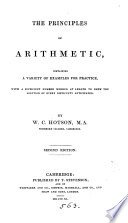 | Wales Christopher Hotson - 1842 - 306 pages
...a negative quantity be transferred, it is equivalent to adding the same quantity to both sides. (3) Both members of an equation may be multiplied or divided by the same or equal quantities. Hence, an equation may be cleared of fractions by multiplying both its members... | |
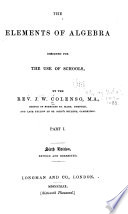 | John William Colenso - Algebra - 1849 - 262 pages
...one unknown quantity has as many roots as it has dimensions, and no more. 37. Every term of each side of an equation may be multiplied or divided by the same quantity, without destroying the equality expressed by it. Thus, if Sx + £ x = 34, multiplying every term by... | |
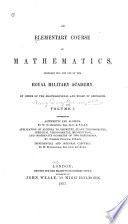 | Royal Military Academy, Woolwich - Mathematics - 1853 - 476 pages
...be removed from each side. Thus if x 4- с — a + c, then will x = a. 86. Every term of each side of an equation may be multiplied or divided by the same quantity, without affecting the equality. x Л Thus if - + 7 =9, theu multiplying every term by 5, we get U ж... | |
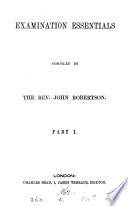 | John Robertson (LL.D., of Upton Park sch.) - 1861 - 140 pages
...of one unknown quantity has as many roots as it has dimensions and no more. Every term of each side of an equation may be multiplied or divided by the same quantity, without destroying the equality expressed by it. For the solution of Simple Equations, containing only... | |
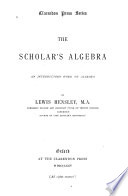 | Lewis Hensley - Algebra - 1875 - 274 pages
...will remain equals if divided by 3, giving Hence we have the general principle : — II. Every term of an equation may be multiplied or divided by the same quantity. If — x + a = b — f c—b +a -=x — b+c = x—a, and we have the principle, III. Every term of... | |
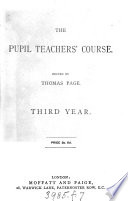 | Moffatt and Paige - 1879 - 474 pages
...is the root of the equation. The following principles should be particularly noticed. (1) Each side of an equation may be multiplied or divided by the same quantity without destroying the equality. The truth of this is obvious. If two quantities are equal, then the... | |
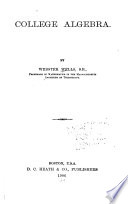 | Webster Wells - Algebra - 1890 - 604 pages
...may be added to, or subtracted from, both members of an equation without destroying the equality. II. Both members of an equation may be multiplied, or divided, by the same quantity without destroying the equality. lei. Transposition of Terms. A term may be transponed from one member... | |
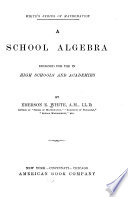 | Emerson Elbridge White - Algebra - 1896 - 418 pages
...equals, the results will be equal. 141. These axioms, when applied to algebraic equations, show that II. Both members of an equation may be multiplied or divided by the same number. Thus, if x = 12, xx 3 = 12 x 3 ; and if x = 12, x -=- 3 = 12 -H 3. III. Like powers and like... | |
 | Webster Wells - Algebra - 1897 - 522 pages
...may be added to, or subtracted from, both members of an equation, without destroying the equality. 2. Both members of an equation may be multiplied, or divided, by the same number, without destroying the equality. 72. Transposition of Terms. Let the equation be x + a = b.... | |
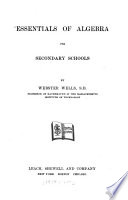 | Webster Wells - Algebra - 1897 - 422 pages
...may be added to, or subtracted from, both members of an equation, without destroying the equality. 2. Both members of an equation may be multiplied, or divided, by the same number, without destroying the equality. 72. Transposition of Terms. A term may be transposed from... | |
| |